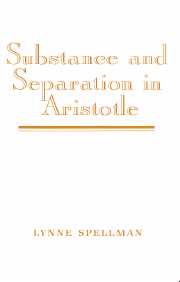III - A Theory of Substance
Published online by Cambridge University Press: 04 December 2009
Summary
Aristotle's account of substance involves yet another case – indeed the most central case – of his use of numerical sameness without identity, and in this chapter I offer an interpretation of Aristotle's views about substance which depends on that distinction. The task of interpreting VII–VIII has, of course, been undertaken many times, and yet nothing approaching a consensus has been reached. My strategy is to argue that Aristotelian substances are specimens of natural kinds, where such specimens are numerically the same as but not identical with sensible objects. I maintain that, if a distinction between numerical sameness and identity is posited, Aristotle's view is consistent, his claim about the separation of substance is intelligible, and his requirement that substances have ontological and epistemological priority is satisfied. This chapter begins with a brief discussion of the Categories and proceeds to consideration of how Aristotle's position in that work is affected by the demand in the Metaphysics for the epistemic priority of substances; separation and ontological priority will be considered in later chapters.
In the Categories, an early work, Aristotle makes a distinction between what is present in a subject, what is said of a subject, what is both, and what is neither (1a20–1b6).
- Type
- Chapter
- Information
- Substance and Separation in Aristotle , pp. 40 - 62Publisher: Cambridge University PressPrint publication year: 1995



